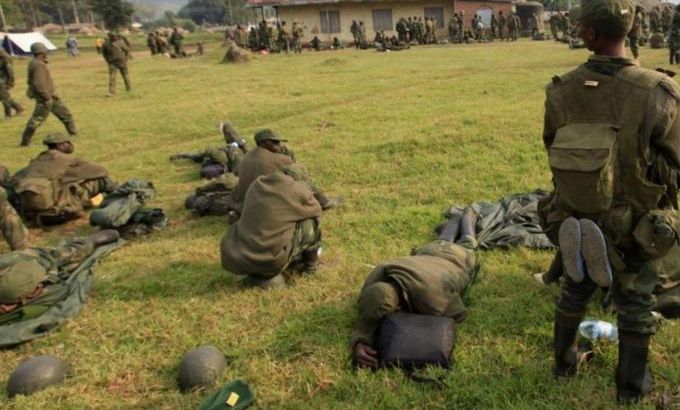Reports of rape and looting by DRC soldiers
Residents of eastern town say defeated Congolese soldiers are taking their loss to M23 rebels out on them.

Minova, Democratic Republic of Congo – Beaten and disorganised, Congolese soldiers have been accused of going berserk in this eastern town after their resounding defeat at the hands of the M23 rebels.
Locals in the lakeside town of Minova in Democratic Republic of Congo (DRC) say many of the soldiers were drunk and acted aggressively against residents over the last weekend, after they had been driven out of the provincial capital of Goma by the rebels.
“Things are not at all well here,” said Mousinganga Siprian, whose anger at the soldiers’ actions outweighed his reluctance to openly criticise the army. “There are very many soldiers here now. They have looted, they have killed, they are raping our women.”
Another resident, speaking anonymously for fear of reprisal attacks, said: “The soldiers came and they started to shoot and rape our women. They stole all the food and goods in the shops. They said if anyone spoke out against them, they would be killed.”
The troops had arrived in Minova on Thursday after a renewed assault on rebel positions in the nearby town of Sake.
The army offensive surprised the rebels, and briefly forced them out of Sake. However, the gains were short-lived and before long the government soldiers had been forced into a mass retreat.
Though it was impossible to independently verify accounts of the allegations, a source at the UN peacekeeping force who requested anonymity said the marauding troops had looted homes and shops.
The UN is investigating the accusations. Monusco, the UN force, is also conducting regular nighttime patrols in Minova in an attempt to protect civilians.
Some residents told this reporter government soldiers were preying on those who they were supposed to protect in the first place.
Change of leadership
Government troops in Minova seemed to be in disarray. Soldiers drawn from various regiments roamed together – they had no knowledge where the rest of their regiment was. Finding a commander was also near impossible last Saturday.
|
” What have we done with the traitors? We shot them. “ General Francois Olenga |
The lack of clear leadership has been compounded by the recent suspension of the chief of ground forces, General Gabriel Amisi by DRC President Joseph Kabila. He was given the marching orders following the reversal at Sake, though officially the action came after a UN report accused him of procuring weapons for illegal armed groups.
Amisi was considered one of the most powerful men in DRC and commanded the loyalty of his troops.
Amisi’s replacement, General Francois Olenga, flew to Minova on Saturday to begin trying to raise morale and organise the soldiers into a reliable fighting force.
By Monday it appeared that Olenga had made some progress. Military police were seen herding drunk soldiers away from the street and reprimanding those who misbehaved. Olenga said the situation in Minova was “evolving positively”.
“We are the national army, we must not behave [or] put ourselves on the same illegal footing as M23,” he said. Asked how he planned to deal with indiscipline in the ranks, his response was chillingly firm. “What have we done with the traitors? We shot them.”
For the time being though, the M23 rebels hold all the cards with its leader heading to Kampala for Uganda-mediated talks.
The DRC government said it would not negotiate with the rebels until they pulled out of Goma, but the rebels said the government was in no position to set conditions on peace talks.
The M23 was launched by former fighters from the Tutsi ethnic group, the minority that inhabits both Rwanda and DR Congo.
The rebels were integrated into the military under a March 23, 2009, peace deal from which their name is derived. The mutineers say the terms of that deal were never fully implemented.
Fighting has created a humanitarian crisis, forcing tens of thousands of people to flee, amid persistent reports that M23 rebels have carried out atrocities against local people.